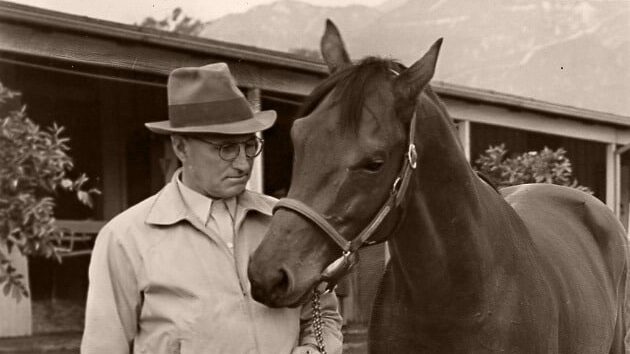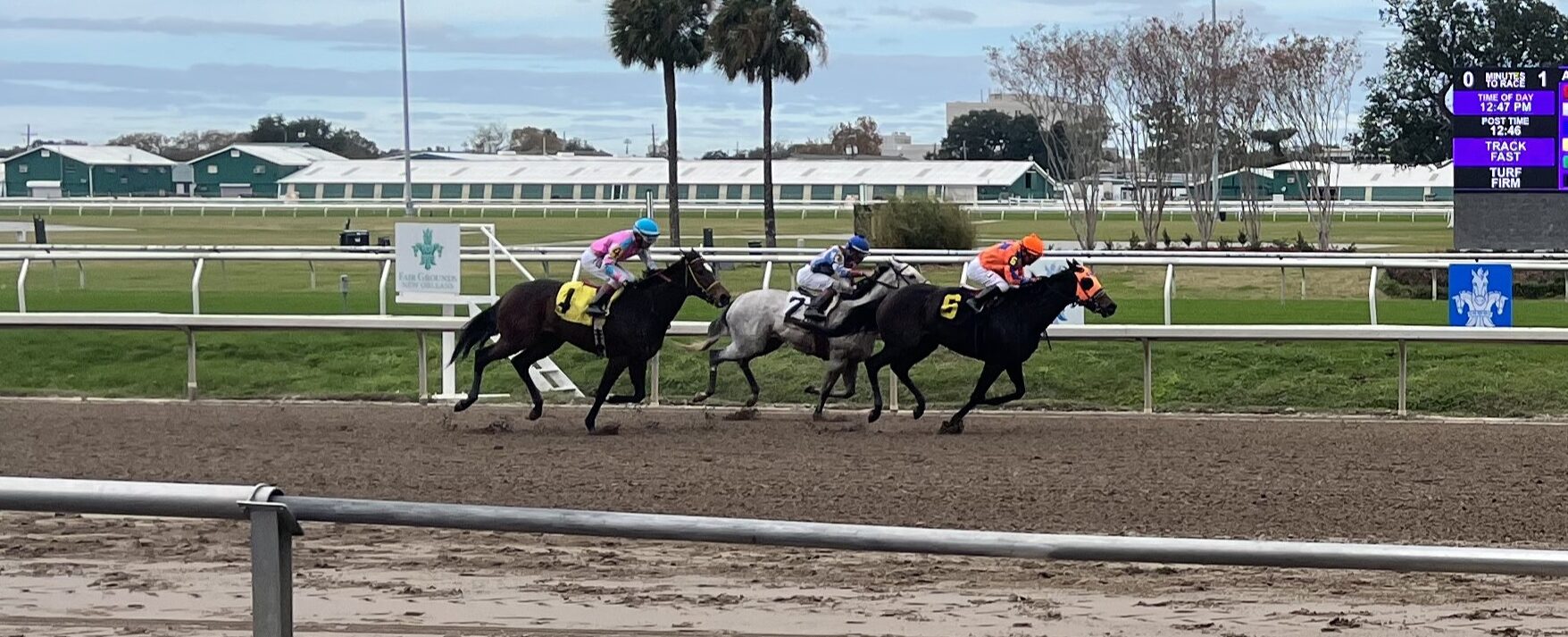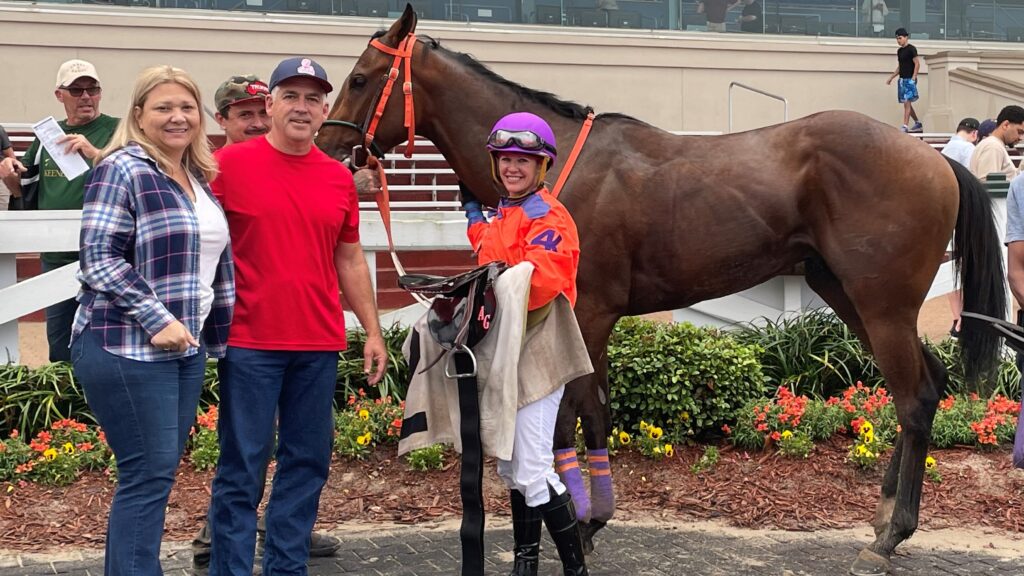Last updated: July 3, 2025
Claiming races are the foundation of horse racing’s competitive and financial structure, offering racehorse ownership opportunities, maintaining balanced competition, and fueling the sport’s economic flow. They drive over 50% of U.S. races at tracks like Santa Anita, Churchill Downs, and Aqueduct, powering the American racing economy.
With over 25 years of experience as a racehorse owner and trainer, I’ve participated in countless claiming races—some highly successful, others valuable learning experiences. My firsthand knowledge and insights from industry leaders make this guide an invaluable resource on claiming races.
In This Guide, You’ll Learn:
✔ How claiming races work, step by step
✔ Lesser-known strategies for evaluating claim-worthy horses
✔ Common misconceptions (and the truth behind them)
✔ How claiming races impact horse racing’s economy
✔ Real-world lessons from my claiming race experiences
By the end, you’ll be equipped to make smarter, more confident decisions in claiming races.

What Is a Claiming Race in Horse Racing?
A claiming race is a race where every entered horse is available for purchase (“claimed”) at a fixed price before the race begins. The goal is to balance competition by ensuring horses race against those of similar ability.
📌 Why Claiming Races Matter
✔ Ensure Competitive Balance – Stops top-tier horses from dominating lower-level races.
✔ Provide Buying Opportunities – Owners can acquire race-ready horses without waiting for young prospects to develop.
✔ Support Small Stables – Trainers and owners use claiming races to refresh their rosters affordably.
✔ Fuel the Horse Racing Economy – Claiming races account for over 50% of all U.S. races, generating millions in purse money and horse transactions yearly.
🔗 Industry Data: National Thoroughbred Racing Association (NTRA)
Beyond their financial impact, claiming races often serve as stepping stones for horses moving up the class ladder. Many eventual stakes winners started their careers in claiming races before developing into stronger competitors under new trainers.

Claiming Race Process: How It Works Step by Step
1. Submitting a Claim
✔ Must be filed 15-20 minutes before post time at the racing office.
✔ The claim slip includes:
✅ The horse’s name
✅ The claiming price
✅ The new trainer’s name
📌 Claims are binding, but in most U.S. jurisdictions under HISA, a claim is voided if the horse suffers a serious injury during or just after the race (e.g., is vanned off or placed on the veterinarian’s list for lameness). See HISA Rule 2262.
💡 Personal Experience: I once claimed a promising filly in a $7,500 claiming race. She stumbled at the start, finished last, and later needed expensive vet care. Lesson learned: Always inspect the horse pre-race if possible.
🔗 Related Guide: How To Evaluate Horses In Claiming Races: Tips For Buyers
2. What Happens When Multiple People Submit a Claim? (Shake)
When multiple buyers submit a claim for the same horse, a shake occurs. Racing stewards conduct a random draw (usually using numbered pills or dice) to determine the new owner.
📌 At tracks like Santa Anita & Gulfstream Park, 5-10 claims per horse are common, making shakes a regular event in competitive claiming races.
3. Ownership Transfer & Prize Money
✔ The new owner takes possession immediately after the race.
✔ The previous owner keeps any prize money earned in that race.
✔ The horse races under the original trainer’s silks for that race but moves barns afterward.
🔗 Source: Equibase – Official Claiming Race Results

How Claiming Races Compare to Other Race Types
| Race Type | Description | Key Characteristics |
|---|---|---|
| Claiming Race | Horses are available for purchase at a set price. | Ensures competition balance; frequent transactions. |
| Maiden Claiming | For horses that have never won a race. | Affordable entry-level races for young/unproven horses. |
| Allowance Race | Higher purses without horses being eligible for a claim. | Competitive step between claiming and stakes races. |
| Stakes Race | The highest-level races featuring elite horses. | Large purses; no claiming allowed. |
📌 Misconception: Many assume claiming races are for low-quality horses, but champions like Seabiscuit started in claiming races.
🔗 Related Story: How Seabiscuit Rose from Claiming Races to Stardom

Claiming Race Classes Explained: Understanding Restrictions
Not all $5,000 claiming races (or any price level) are equal. Restrictions on race conditions significantly affect competitiveness and horse eligibility.
✔ Clm5000 Open – Any horse can enter, regardless of past wins.
✔ Clm5000n2L – Only horses who haven’t won two races in their lifetime can enter.
✔ Clm5000n3L – Only horses who haven’t won three races in their lifetime can enter.
✔ Clm5000n2y – Only horses who haven’t won twice in the last year (12 months) can enter. (Some tracks use 6-month conditions, but “n2y” typically refers to a year.)
✔ Clm5000n1y – Only horses who haven’t won a race in the last year (12 months) can enter.
✔ Clm5000n2x – Only horses who haven’t won two races at this specific level (claiming price or lower) can enter.
✔ Mdn5000 – Only horses that have never won a race (maidens) can enter.
🔗 Source: TwinSpires Guide to Claiming Races
📌 Strategy Insight: A horse dropping from Clm5000 Open to Clm5000n3L faces a much bigger class drop than one moving from Clm5000n2y to Clm5000n1y, where competition can still be strong.

Hidden Risks & Strategies for Success
Risks for Buyers
⚠ Hidden Injuries – Some horses carry undiagnosed issues that surface after the claim.
⚠ Wrong Racing Fit – A claimed horse may not thrive under a new trainer’s program.
📌 Personal Lesson: I once claimed a horse based on workout times rather than appearance—only to find out post-race that it had lingering leg soreness. Lesson learned: Always inspect in person when possible.
Risks for Sellers
⚠ Losing a Developing Horse – A horse might improve dramatically after being claimed.
⚠ Reputation Risks – Overusing claiming races can signal a trainer frequently offloads underperforming horses.
🔗 Related Guide: How to Avoid a Bad Claim in Horse Racing

Watch this insightful video explainer to understand the basics of claiming races and the strategic decisions involved:
Optional and Waiver Claiming Races
Optional claiming races let horses meeting allowance conditions (e.g., non-winners of three races other than maiden or claiming) run without a claiming tag, reducing risk for owners. Waiver claiming, common at tracks like Aqueduct, allows new owners to enter horses without immediate claiming risk post-purchase. These variations add strategic depth to claiming races (West Point Thoroughbreds).
FAQs on Claiming Races: Common Questions Answered
If you’re new to claiming races, having questions is natural. Here are some quick answers to help you understand the basics.
Who can participate in claiming races?
Licensed owners, trainers, and authorized buyers can enter or claim horses. A racing license is required. Pennsylvania Racing Commission (§ 303.6. Licensing requirements for owners
What happens if a horse is claimed before a race but gets injured?
In most modern U.S. racing jurisdictions, if a horse is claimed before a race but gets injured during or just after the race, the claim is voided and the original owner keeps the horse. See HISA Rule 2262
Why do trainers enter good horses in claiming races?
Trainers use claiming races to match competition, cash in on peak value, or manage stable size, not just to offload declining horses.
How does a “shake” work in claiming races?
When multiple buyers submit claims for the same horse, a random draw (shake) determines the new owner. Racing stewards use numbered pills or another method to ensure fairness.
Can a claimed horse race under a new trainer immediately?
Yes, but the horse must complete the claiming race under its previous trainer’s silks. Once the race is over, the new trainer takes possession.
What are optional claiming races?
Horses meeting allowance conditions (e.g., non-winners of three races) can run without a claiming tag, offering owners flexibility.
How do claiming races affect betting?
Bettors often target horses dropping in class (e.g., from Clm5000 Open to Clm5000n2L) for value, but hidden injuries can skew odds (TwinSpires).
What are the risks of claiming a horse?
Buyers risk hidden injuries or poor fit with a new trainer, while sellers may lose a developing horse or face reputation risks if frequently claiming (Equibase)
Share your story in the comments! Vote to see what others think.

Final Thoughts: Should You Get Involved in Claiming Races?
✔ Claiming races offer an affordable way to own competitive racehorses.
✔ They provide buying & selling opportunities but require careful evaluation.
✔ Understanding race restrictions is key to making informed decisions.
Next Steps: Get Exclusive Insights & Join the Conversation
- 📩 Subscribe for Insider Tips – Get strategies, real-world success stories, and a free Horse Buyers Checklist.
- 📞 Ask the Experts – Have questions? Reach out to mileshenry@horseracingsense.com.
- 💬 Join the Discussion – Share your experiences in the comments below!
- 📢 Spread the Word – Found this guide helpful? Share it with fellow racing enthusiasts!
Claiming races can be a smart strategy or a costly mistake. With the right insights, you can navigate them successfully. If you’ve ever been part of a claiming race, share your experience below!


About the Author: Miles Henry
Lifelong Horseman | Racehorse Owner | Published Author
Miles Henry brings over 25 years of hands-on experience training and owning Thoroughbred racehorses. Raised with Quarter Horses and Appaloosas, he’s spent a lifetime learning from horses—on the track, in the barn, and in the field. Today, he runs a small but successful racing stable in Louisiana and shares real-world insights on HorseRacingSense.com, helping horse owners, fans, and bettors navigate the sport with confidence.
📚 Books: View Miles’s books on Amazon »
🎧 Podcast Guest: Animal Tales Ep. 32 |
YouTube Interview
📩 Newsletter: Sign up for racing tips and horse care advice »
🔗 Follow Miles:
Twitter |
Facebook |
YouTube


